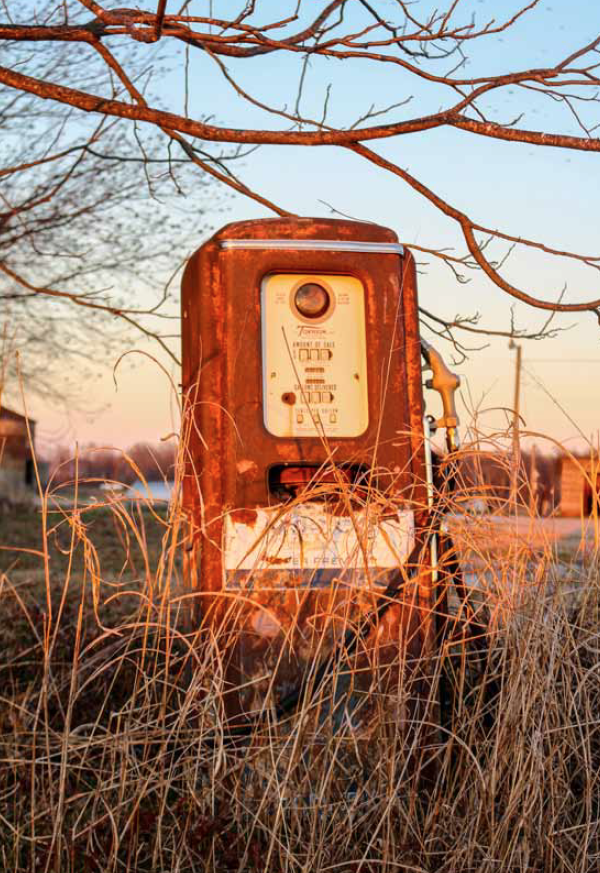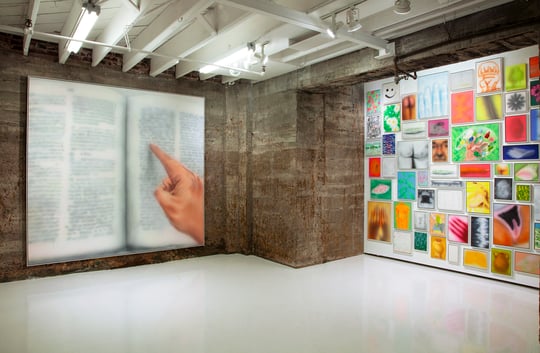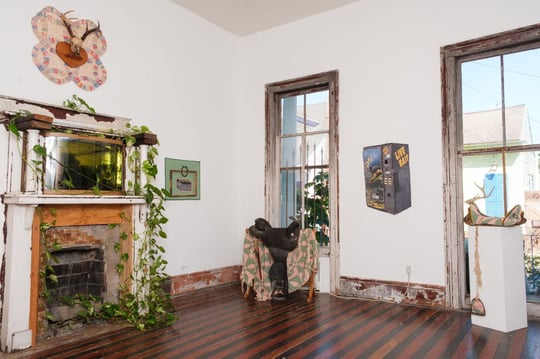
Poet and “Army brat” Ann Fisher-Wirth spent her childhood in Washington D.C., Germany, Pennsylvania, Japan and California, but her new collaborative book with photographer Maude Schuyler Clay gives the appearance that she was born and raised in Mississippi. Each of her 47 poems – all of which explore connections between Mississippians, the environment and home – appears on a spread with a color photo taken by Clay.
“If you’re not from Mississippi, it’s hard to claim the right to write about it,” Fisher-Wirth says. Although she has lived in the Magnolia State for the past 30 years, she says that Clay, who is fifth generation Mississippian, brought an authority to the collection that she could not. But anyone who reads Mississippi will find that Fisher-Wirth has a deep understanding of the complex lives of Mississippians. She slides into a variety of personas to bring Clay’s photos to life in breathtaking ways: Glass swans elicit senile dementia, shadows on a diamond-patterned rug evoke a romantic hotel getaway, and a reflective store-front window calls forth the struggles of a beauty queen. Inspired by Emily Dickinson, Fisher-Wirth omitted titles so that each poem would be identified by its first line, which also positions the photo as a visual title.
As Clay explored Mississippi with her camera over the past ten or so years, she sent Fisher-Wirth e-mails of random photos with vague, simple captions such as “pink house.” Fisher-Wirth then selected the images that spoke to her and “joggled bits” in her imagination. Clay said that she initially took the photographs with her own projects in mind and was delightfully surprised to discover how Fisher-Wirth found particular voices in the photos. Whether it be a story inspired by a person, a conversation she heard, or an experience from her own life, Fisher-Wirth says she aimed to respect the voices she imagined in the photos.
Using free verse that feels like it is floating off the page, Fisher-Wirth explores the white space on a page just as a farmer cultivates land – she methodically plots words and pauses to reflect the story she’s telling. In the first photo of the collection, Clay captures a serene moment in which an abandoned canoe drifts on the surface of a moss-filled swamp. Shadows from a tree standing on a bluff in the center divide the sunny scene into two parts, which Fisher-Wirth represents by placing line breaks between visually descriptive language in order to convey memories of presence and absence:
Between two worlds
the soul floats
nothing remains
but purple flowers smeared across the trees
a silver boat tucked in against the bank
the fecund pond like greenish velvet

Fisher-Wirth was inspired by Dutch and Flemish Renaissance painter Pieter Bruegel to take on the voice and perspective of a subject in the image, and in doing so, she utilizes vernacular that makes us feel like we are in conversation with the speaker of the poem. She shies away from formal literary language and embraces orality: a photo of an empty green space enclosed by brick walls sparked a memory in Fisher-Wirth’s mind about a female student she taught in Mississippi 27 years ago. After learning the story of Antigone, the school girl declares, “No way in hell Id let them vulchers eat my brother / no ma’am Id do just like Angon done / my daddy my brother my cusin all them… family the only thing that matters.” Fisher-Wirth says she wanted to honor the student’s “ferocity about family loyalty.”

The carefree first line of another poem, “I said write me, Jig Jig,” pulls readers into the world of a young girl living in Tula who has in her bedroom, as the photo displays, a framed picture of a poodle that hangs above glass shelves with a strand of pink flower lights, a jar of coins, silver tinsel, a ceramic parrot and a Japanese lucky cat figurine. Before even reading the poem, we are able to get a sense of the girl’s bubbly, animated personality. She talks of how she missed her school sweetheart “Jig Jig” when she went to Memphis to visit a friend: “I missed his fuzzy chin, / how he’d bid for my lunch box.” Before leaving, she had told Jig Jig exactly what to write in a love letter and he followed her instructions, signing “Love, your immorata J.J. Mooney,” only for her to realize she “had to dump him” because he’s “dumb as an egg.” The two stanzas of the poem – both left aligned with an indent marking the second – represent the fickle duality of young love. The quick pace of the poem combined with the image of the bedroom wall makes us feel like we are lounging in the girl’s room, casually chatting with her.
The tone becomes a bit worrisome in a photo of a cotton field on a cloudy blue day. The prose narrative poem is written from the first-person perspective of a cotton farmer who’s caught in a drought and is struggling to pay for the orthodontia of his third wife’s child: “And I still got to be paying child support to the deep-dyed bitch who run me out, and the other one, Bonnie, good Christian woman, good cook too, but she didn’t take to doin the dirty.”

Darker voices engulf us with a photo of the ruins that were once the Bryant Grocery Store in Money, Mississippi – where the Emmett Till incident took place in August 1955. Trees and shadows loom around the rubble, representing how although time passes, events as atrocious as the Till murder refuse to fade into oblivion. In the accompanying poem “He ain’t done right to whistle,” an old woman from Money – who said she “sure as hell don’t believe his uncle / / shoulda stood up and pointed out / Roy and J.W. in that courthouse” – laments of people coming to interview her “just because we / was alive then making out like this / / is a bad town y’all don’t know.” The very next photo looks down the dusty back-entrance steps to the Tallahatchie County courthouse, where the trial of Till’s murderers was held. Instead of trying to forget about the trial, as the speaker in the previous poem does, this speaker, who was a kid when the incident occurred, is haunted and ashamed of his folks who say: “get the sheets / go rough up some a them teach em / what’s right.”

Empathy is a storyteller’s art, Fisher-Wirth writes in the foreword of Mississippi. Only if we listen and immerse ourselves in the world around us are we able to see and hopefully understand each other. Fisher-Wirth writes that she disagreed with a snarky comment on Facebook saying that expressions such as “might could” and “aks” are not English. “I honor the voices, no matter whose they are, both white and African American,” Fisher-Wirth writes. The poems, however, do not explicitly point out the race of the speaker, because the point of Mississippi is not to pigeon-hole certain identities but rather to celebrate the rich orality of the state and promote equality. Instead of elevating educated voices above uneducated, Mississippi reminds us that we are all more alike than different – regardless of one’s background, everyone experiences the human condition.
One day a few weeks ago, I stayed up all night to finish assignments and the next day just felt inferior to all of my classmates – I was exhausted, nervous to raise my hand and laughing cynically in my mind at all the dreams and ambitions I’ve ever had. I called my boyfriend and he insisted on picking me up and taking me to Sardis Lake. Not wanting to put myself in a deeper rut by neglecting my studies – I brought Mississippi along. When we read the poem on page 86, I couldn’t believe how it resonated with my frame of mind:
Swear to God
what with Billy’s croup
and the baby’s cutting teeth
sometimes I’m up all night
baby on the boob
me and Billy and baby
crouching by the kettle in the steam tent
Sometimes I get so tired
My face breaks out all gray
And little red spots
One supper I burned the fish sticks
Stank up the kitchen something good
Billy looks at me Mama!
So I threw the plates to the floor
and commenced to cry
But that sweet man–
cracks me a beer
scoops up Billy and the baby
winks at me
tells me
We’ll mess with this shit later
puts us in the truck and drives us to the lake
Breathe he tells me
baby breathe
and look at it
just look at it
Nowadays, with smartphones and social media, we barely look up to watch the sun set or listen to our friend at dinner. With such a divisive political climate, we need empathy more than ever, and that is exactly what Mississippi provides us with. Everyone, regardless of race, class or gender, is struggling with something, and Fisher-Wirth’s lyrical poems bring to life the pursuits and struggles captured in Clay’s photography of the state. Instead of judging one another, we should place ourselves in each other’s shoes as Mississippi does. Fisher-Wirth – an educated white woman – may not have personally experienced all of the stories depicted in the collection, but as Mississippi poet Natasha Trethewey once said in a lecture at Emory University, a subject matter chooses a poet, not the other way around. In the lecture, Trethewey praised young white poet Jake Adam York’s 2008 poem about the 16th Street Baptist Church bombing, “The Crowd He Comes,” for portraying a collective responsibility among readers to confront our shared history. “Social justice may not be an aim when poets sit down to write, but it can be an outcome,” Tretheway said, which I believe directly applies to Mississippi.





